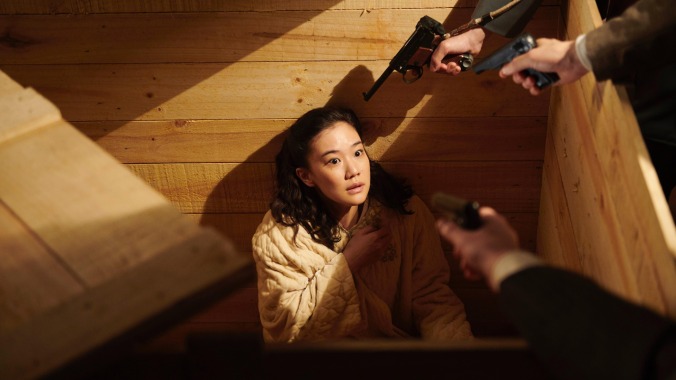Kurosawa’s latest film, Wife Of A Spy, is ostensibly a wartime thriller, set in the months before the Japanese bombed Pearl Harbor and drew the United States into World War II. As is his wont, Kurosawa sacrifices some conventional edge-of-the-seat genre elements, making a somber, slow-paced drama about a seemingly happy married couple whose bond gets strained as they find themselves involved in international espionage. The movie is sometimes quiet and poky to a fault; a few cheap pulp thrills might’ve made it feel more vital from start to finish. But Kurosawa and co-screenwriter Ryusuke Hamaguchi do gradually build tension and intrigue across Wife Of A Spy’s two hours, while also openly confronting a dark chapter of Japanese history.
Yû Aoi plays the title character, Satoko Fukuhara, an actress and socialite married to a thriving importer-exporter, Yusaku Fukuhara (Issey Takahashi). The couple are firmly a part of the establishment, with close ties to a high-ranking military officer, Yasuharu Tsumori (Masahiro Higashide), who grew up with Satoko and still has a crush on her. But Yusaku can already see that Japan’s increasing nationalism and militarism is going to make it harder for him and his wife to keep living a cosmopolitan lifestyle. So when he and his nephew, Fumio (Ryôta Bandô), return from a trip to Manchuria with evidence that the Japanese government is conducting cruel medical experiments on Chinese prisoners, Yusaku tries to use the intelligence to earn sanctuary in the United States.
Wife Of A Spy is mostly told from Satoko’s perspective, though Kurosawa ultimately keeps both his heroine and his hero somewhat at a distance, never entirely revealing what either is really thinking until very late in the plot. As Yusaku begins making moves to betray his country and expose something shockingly immoral, the previously apolitical Satoko seems torn by how to react. Should she stand by her man, or tip off Yasuharu? Meanwhile, Yusaku’s own motivations may not be as noble as he insists. Is he truly trying to right a wrong or is he just looking for an excuse to flee a society that’s becoming inhospitable to his westernized tastes? Or—as Taiji suggests—is something even more sinister afoot, involving a recently murdered young woman whom Yusaku and Fumio were seen with when they returned from Manchuria?
There are moments in Wife Of A Spy when Kurosawa leans back on his horror roots, including one gruesome torture sequence, and a scene where Satoko watches the damning, spooky-looking film that Yusaku and Fumio brought back from their trip abroad. For the most part, though, this is a thriller that’s low on actual thrills, where even the tense confrontations with the authorities have a certain matter-of-factness. It all culminates in a climactic attempted escape, followed by an epilogue that stubbornly leaves the characters’ fates semi-ambiguous.
But while Kurosawa loses some of the visceral kicks of an old-fashioned cat-and-mouse story with a rousing ending, he does find a lot of juice in his movie’s subtext. Wife Of A Spy is less about the war crimes that drive the narrative and more about how Satoko and Yusaku respond to their marriage’s first serious test. It was easy for them to be perfect, supportive spouses when they were rich and popular. But as they prepare to sacrifice everything they’ve built together, both have to deal with the attendant paranoia, wondering who to trust. And it’s typical of Kurosawa that in a film about a couple weighing where their loyalties lie, the question first starts with their surface patriotism and then keeps creeping deeper, until they’re staring warily at each other.










































